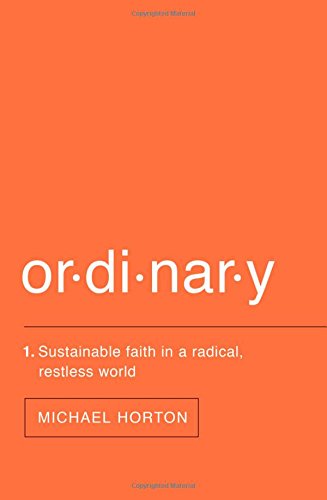Review: Michael Horton’s Ordinary
“We need fewer Christians who want to stand apart from their neighbors, doing something that will really display God’s kingdom in all of its glory. We need more Christians who take their place alongside believing and unbelieving neighbors in the daily gift exchange.” —Michael Horton, Ordinary. (p. 167)
There are billboards for the next big thing. There are the quarterly showcases of the latest newest. The world is enraptured with new and better. In Ordinary, Michael Horton argues that this same restless and revolution-seeking attitude is prevalent not only in the world (e.g. business, marketing, etc.) but also within the church. The next big pastor will be at the next big conference. The next big teacher will publish the next big program with that publishing company known for innovation. “Rinse, wash, and repeat” the shampoo bottle says. This psychological and sociological bent for more, better, and now creates an endless spiral where the latest must always be an improvement on the last or suffer ridicule. In the church, this has translated to—stay with the times or be left behind. “How to keep millennials in church” being the recent favorite get-with-the-times fad. More authentic. More results. More cowbell.
In Ordinary, Horton presents a stunning counter-cultural strategy to negate religious restlessness—be ordinary. Stop seeking that next big thing and settle into sustainable Christian living. In “Part 1: radical and restless” (chapters 1-6), Horton addresses this epidemic of socially accepted ambition (chapter 5) and what impact it has on the church (chapters 4 and 6). The problem is both personal and pastoral. It exists in houses and congregations. After some godly criticism (chapter 1), Horton defends ordinary living as “not mediocrity” (chapter 2) and “not passive” (39). Ordinary is not settling for less than what God has commanded. Being content is not resorting to half a Christian life. Instead, these are indications that Christ and God’s ordinary means are being manifest in Christian life.
Horton speaks about how community and technology battle against each other in an unprecedented way (58-65). “The next big thing” has become “a tradition unto itself” (70-74) as it continues to buck tradition. This restless desire for something better has brought the church into a perpetual search for spiritual revival (74-80). For Horton, obsession over revival, a concept unfound in the Scripture, occurs when the church diminishes God’s ordinary means and begins to seek something miraculous. It permits the church to put off today the tedious task of living faithfully in God’s gift as it waits for God’s special gifts tomorrow.
In “Part 2: ordinary and content” (chapters 7-11), Horton begins to expand on what ordinary, vocational Christianity looks like. Fundamentally, ordinary Christian living is less contractual and more covenantal (129-135). This affects homes, congregations, work places, and relationships. This also reveals Horton’s real solution to restless Christianity: historical, confessional Presbyterianism (117-119, 139-144, 146-149, 182-189). Horton’s solutions are Presbyterian solutions and many evangelicals as well as Reformed Baptists will be unable to get behind every one of them.
In conclusion, Ordinary is an outstanding little book. For individuals who are already in confessional Presbyterian churches, Horton’s words will be preaching to the choir. Worship centered on the means of grace, catechismal instruction, and family worship have long been staples of the Reformed tradition. For those outside this tradition who are searching out a normal and vocationally focused Christianity, Ordinary will promote great thought and discussion.
Disclosure of Material Connection: I received this book free from the publisher. I was not required to write a positive review. The opinions I have expressed are my own. I am disclosing this in accordance with the Federal Trade Commission’s 16 CFR, Part 255: “Guides Concerning the Use of Endorsements and Testimonials in Advertising.”

Joshua Torrey is a New Mexico boy in an Austin, TX world. He is husband to Alaina and father to Kenzie & Judah and spends his free time studying for the edification of his household. These studies include the intricacies of hockey, football, curling, beer, and theology. You can follow him @AustinPreterism and read his theological musings and running commentary of the Scriptures at The Torrey Gazette.
